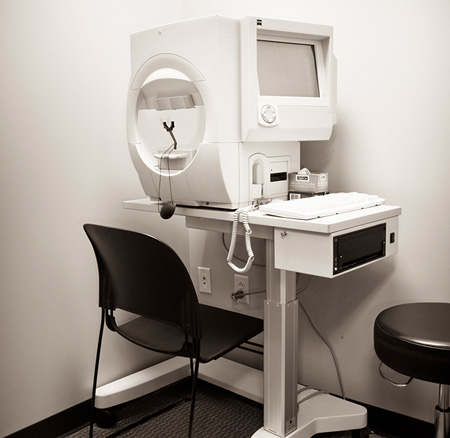Special Eye Testing
Special eye tests mean extra special eye care!
ZEISS / Humphrey Visual Field Testing
Visual Field testing can help save vision because it is another test used to diagnose or rule out glaucoma and other neurological disorders that affect vision. This simple, but effective service has saved lives by detecting various medical conditions such as strokes, brain tumors, and other neurological defects.
Anterior Camera
Our anterior segment camera helps us to document skin types as well as lesions and morphological abnormalities of the skull, eye lids and surrounding areas. We can also use pictures of the head and shoulders, face and eyes to document nerve anomalies.

Optical Coherence Tomographer (OCT)
Our OCT helps us better manage glaucoma and diseases of the retina because this technology allows the eye doctor to see the deep tissue layers in the eye. Similar to ultrasound, this diagnostic technique employs light rather than sound waves to achieve higher resolution pictures of the structural layers of the back of the eye. These high-definition images are the only way that they can actually see beneath the surface to the nerve fiber layers where damage occurs. Up until now, eye doctors had to use other tests to indicate damage in this critical area of sight. Common eye diseases such macular degeneration, diabetic retinopathy, and glaucoma are detected early by the OCT when the diseases can be more effectively treated.
Retinal Digital Imaging – Fundus Photography
A high-definition digital image of the retinal area helps your eye doctor diagnose and manage eye diseases in the delicate retinal area. Damage to these delicate structures of the retinal area is often the first sign of systemic diseases such as MS, diabetes and more. The retina is the “window to the body” and routine retinal imaging can help your eye doctor monitor the changes in your eye health from year to year.
Our Relationship with local Specialists keeps you seeing your best.
LASIK Vision Correction
In our office, you will receive a thorough and detailed assessment to determine your candidacy for laser vision correction. You will have an opportunity to ask any questions that you may have. Our doctor is fully certified and experienced in laser vision correction pre- and post-operative care.
We know that laser vision correction is a considerable decision, and your needs and expectations will be taken into account in the evaluation process. You will receive an unbiased recommendation as to your suitability for the procedure.
Cataract Surgery & Low Vision
A cataract is a clouding of the lens inside the eye. The lens sits just behind the pupil and is responsible for focusing light. As the lens increases in cloudiness, it becomes more difficult to see objects clearly and bright lights can cause glare. The most common form of cataract is that of aging and it is inevitable as we mature. In most cases, cataracts do not cause any harm to the eye and cataract surgery is only done to improve the vision in which glasses no longer can improve the vision. Cataract surgery is more the patients decision than ours, because we usually recomend surgery only when the cataracts are affecting your daily life. There is no harm in delaying surgery if your life is only minimally affected.
Summary of Services
- Comprehensive Eye Exam – complete evaluation of the visual system and ocular health including dilation (dilation is performed at least every other year)
- Pediatric Comprehensive Eye Exam – complete evaluation of the visual system and ocular health including dilation beginning from six months of age. Eye exams for children are very important because vision problems are often related to poor school performance.
- Contact Lens Fittings – for all types of contact lenses including specialty contact lenses available for astigmatism, presbyopia (the loss of reading vision after age 40-45 years old), and keratoconus (a progressive disease in which the cornea thins and becomes irregularly shaped).
- Specialty Contact Lenses – supply any and all types of contact lenses available on the market.
- Cataract Surgery Care – perform pre-operative and post-operative care following cataract surgery.
- Digital Retinal Imaging – documentation of eye conditions that need to be monitored for changes over time.
- Glaucoma Testing – diagnosis, management and treatment of glaucoma, called the “silent thief of vision” because it has no symptoms until its later stages when vision is already lost.
- Lasik Surgery – perform pre-operative exam to evaluate if you are a good candidate and post-operative care following Lasik surgery.
- Macular Degeneration Management – monitor progression and evaluate if treatment is necessary. Research indicates certain vitamins and minerals may help prevent or slow the progression of macular degeneration.
- Eye Emergencies – including red eyes, injuries and sudden symptoms requiring evaluation and treatment.
- Dry Eye Disease – evaluation and treatment such as punctal plugs, prescription drug treatments, IPL treatment, and monitoring.
- Surgical Consultation and Post-Operative Eye Care Treatment – for cataracts, strabismus, corneal transplants, retinal detachment, Lasik, PRK, and Epilasik and others.
- Frame and Lens Service – prescribe and fill prescriptions for prescription glasses, reading glasses, sunglasses, and specialty glasses for hobbies and occupational needs.
